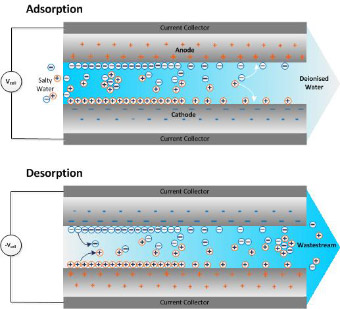Advanced highly selective adsorbents for gas separation and storage
Researcher: Jianhua Zhou (Jessica), PhD candidate
This project looks to identify and synthesize advanced adsorbents for highly selective gas separations such as CO2 from natural gas. Zeolites with critical pore dimensions and “trapdoor” adsorbents will be studied and synthesized and tested for their potential. The primary methods employed in this work are materials synthesis, post synthesis modifications, volumetric and gravimetric isotherm measurement, PSA simulation and other analytical methods such as XRD, TGA, FT-IR and TPD.

Capacitive deionization as a novel approach to wastewater treatment
Researcher: Armineh Hassanvand, PhD Candidate
Capacitive deionization (CDI) is an energy-efficient and promising electrochemical desalination technology that uses no chemicals during regeneration. In this approach, the process stream is passed between two high-capacitive electrodes made of porous carbon materials to which an electrical voltage is applied. As a result, anions and cations are adsorbed on the porous surface of the oppositely charges electrode, and the deionized stream with lower ion concentration flows out of the cell. After a time of operation, the electrodes become saturated and require regeneration. In this step, by reducing or even reducing the cell voltage, adsorbed ions are released into a wastewater. In order to improve the performance, ion-exchange membranes (IEMs) are placed in front of the electrodes. This approach is called Membrane Capacitive Deionization (MCDI).
My prospective PhD project consists of:
- building a laboratory scale (M)CDI unit
- trialing novel carbon electrodes and membranes
- evaluating the optimum operational parameters in the prepared (M)CDI unit.
